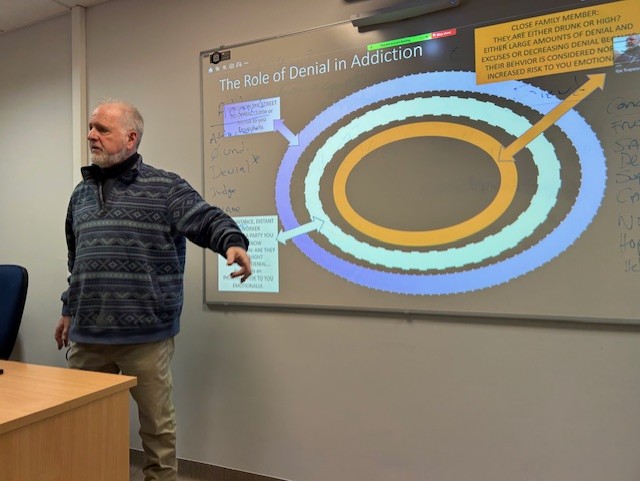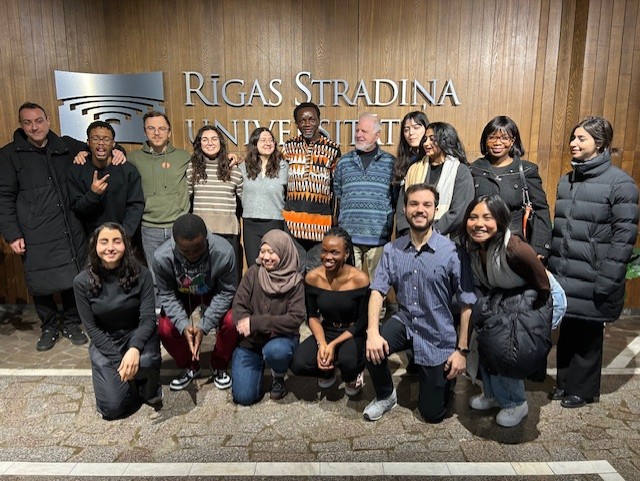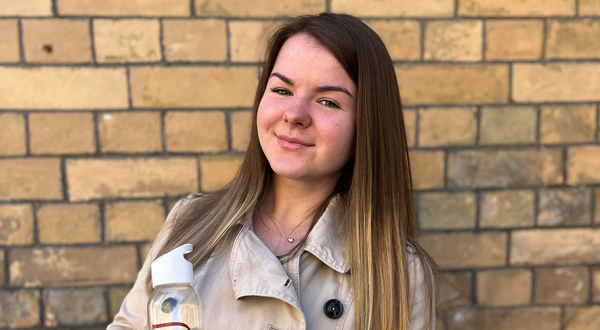Social workers could offer psychotherapeutic support: interview with Visiting Professor Jonathan Kessler
Autore: Linda Rozenbaha,
RSU Sabiedrisko attiecību nodaļa
At the end of March, Jonathan P. Kessler, Assistant Professor of Practice at Merrimack College and visiting lecturer in the Social Work programme at Rīga Stradiņš University (RSU), visited Latvia to deliver a lecture. A popular speaker at RSU, this time his focus was on the differences between the field of social work in Latvia and the United States. In a brief interview, we explored the topic and touched upon the evolving challenges facing American social workers today, including the impact of President Donald Trump’s policies on the field.
‘Social work in the United States developed along two main paths,’ explained Professor Kessler. ‘One focused on individuals, and the other on systems. For example, the government established groups and agencies to support the poor — offices where people could go to receive help when needed. The other path involved working directly with families in their homes, supporting them in their real-life environments. This dual approach has remained in place to this day. Most American social workers are trained to work with individuals and families — either in their homes or in small clinics. The primary goal is to help empower people to change their own lives.’

Prof. Kessler during his lecture
Professor Kessler has taken a keen interest in Latvia’s social support system. ‘The more I learn about this environment and the more I teach here, the more I hope that some of the skills we teach social workers in the U.S., particularly in the field of psychotherapy (what we call clinical practice), could also be applied in social work here,’ he said optimistically.
One of the key differences between social work in Latvia and the United States, according to Professor Kessler, is the scope of psychological support provided by social workers in the U.S. Moreover, psychotherapists in the two countries operate quite differently. ‘In the U.S., psychiatrists are medical professionals who are licensed to prescribe medication. Psychologists, on the other hand, mostly focus on psychological testing — evaluating things like cognitive functioning, brain activity, and learning difficulties. About 85% of what is considered psychotherapy done by psychotherapists in Latvia is actually carried out by social workers in the U.S.,’ he explained.
‘American social workers are trained in clinical therapy methods to work with people as well as to work with systems of government. It’s not only psychotherapists who help those with emotional trauma or mental health issues. If social workers in Latvia had similar skills, they could better understand the individuals they support — whether those people are dealing with mental health disorders, autism, addiction, or trauma.'
‘I would imagine there are fewer psychotherapists than social workers in Latvia. If social workers were trained in these therapeutic skills, it could help ease the overall burden on the system,’ Professor Kessler concluded.
Professor Kessler shared a recent example discussed the day before with a specialist — a social worker from a Latvian hospital: ‘She told me about a 12-year-old girl who was hospitalised after being sexually abused by her older brother and attempting suicide. The girl was also self-harming. The social worker asked me — how can I help her? In the US, we train our social work students to work in these kinds of situations. Thus, social workers provide them with strategies — both educational and therapeutic — to help a child process and recover from such trauma.’
‘I have been told that in Latvia such cases are more often handled by psychotherapists, but it’s social workers who are more regularly in contact with the child. If social workers had the skills to assess the situation, speak to the child, and understand how trauma affects the brain and body, they could provide more effective help and take some of the pressure off psychotherapists to do that same work. By increasing these resources, the child would hopefully be less likely to develop addictions, fall into prostitution, or struggle with depression and anxiety.
‘If the girl spends six weeks in hospital, where she feels safe, but after discharge resumes self-harming, drinking or using drugs, binge eating, or engaging in other self-destructive behaviour – how long will that go on? Until she’s 35, when she again ends up on the radar of social services with her own family due to these untreated concerns?’
‘The only way to break that cycle is through education and support. That’s my main message – social workers in Latvia can be trained in these skills,’ said Professor Kessler.
At the same time, he acknowledges some strong examples of good practice in Latvia – such as family and child community centres that provide assistance to families. In some ways, he admits he’s even a little envious of the progress here, while the social support system in the US is facing growing challenges: ‘I feel that Latvia as a country takes much better care of its people than we do in the US. Unfortunately, with the shift in leadership in the US…’ Prof. Kessler says with a sigh, ‘the rich are getting richer, and the poor are getting poorer. President Donald Trump has made decisions to eliminate many social services that supported those who need it most.’
For example, the US Department of Education in Washington has existed for approximately 40 years. It allocates funding so children can attend college. It also provides money for the administering of testing that helps identify children with autism or developmental/learning needs. It provides support for younger children who may have autism, behavioural issues, or mental health needs. And it seems that the government now — I have friends working in education who may lose their jobs because of these changes — wants to dismantle all of that. Some of the support systems that once helped American families send their kids to college may soon no longer exist. That’s terrifying, because… where will those young people go? Will they even have the chance to pursue higher education, become doctors, scientists, or professionals? Will they have the opportunity to grow and contribute to society?'
'Trump is effectively dismantling the institutions that enabled that kind of development,' Kessler explained.
Professor Kessler also points out that Trump has rejected the concept of gender diversity. One of his first actions was to declare that the United States would recognise only two genders – male and female.
'This decision means there will be no recognition or support for transgender people, or many other gender identities in the LGBTQ community. All funding that was previously allocated to support these individuals will be cut,' he said.
'Social workers or psychotherapists used to be able to support minorities – especially children. Since the 1960s and 70s, understanding of issues like equality, racism, and diversity have been strongly supported. Under President Barack Obama, the country made significant progress toward equality.
People were educated to respect diversity, and promote inclusion from different perspectives. But Trump dismantled all of that. As an example, a week after he came to power for the second time, there was a plane crash. He blamed… the air traffic controllers, claiming they were too ethnically diverse and that their job performance wasn’t as good because they were brought into their jobs under the former administration’s diversity, equity, and inclusion policy,' Professor Kessler said with concern.
‘It’s actually very uplifting to see how inclusive Latvia is. For example, the class I taught today was made up entirely of international students from all over the world.’ Latvia relishes and provides for global understanding through its willingness to participate in international educational initiatives.
At the same time, he acknowledges that Trump’s election reflects broader societal sentiment:
‘The most difficult part for many social workers is that he was elected on the promise that he was going to change people’s economic situations – Americans are very focused on our financial conditions. Many things in the country have become more expensive and less accessible, and people are angry about that (e.g., groceries).’
‘Even though unemployment was low, people are working but can no longer afford what they once could. His way of changing this was to cut out the “waste in government.” The problem is that this has meant cutting many services that social workers and others provide to the poor and less fortunate.’
Some Americans are beginning to realise that not everything he proposes is a good idea. Right now, because of these shifts in social support, many people in the US are feeling very anxious and uncertain,’ Professor Kessler concluded.

Prof. Kessler with RSU students
Related news
 Lending a helping hand. A photo story by a social work student at RSUFor Students, Topošajiem studentiem
Lending a helping hand. A photo story by a social work student at RSUFor Students, Topošajiem studentiem


